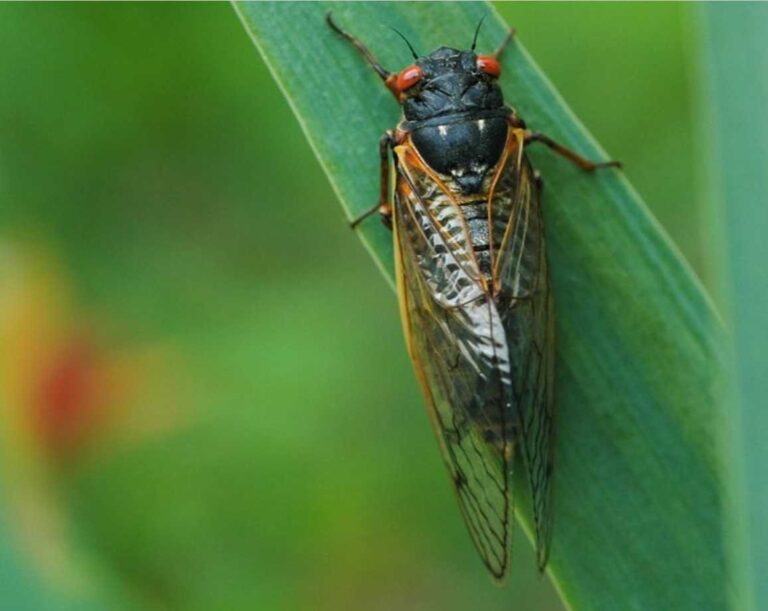CHAMPAIGN – After lying dormant for 17 years, billions of Cicadas – big insects with big wings are awakening in far eastern Illinois, Indiana, Ohio and other states.
Illinois Newsroom’s Reginald Hardwick talked with Katie Dana, the scientific specialist in entomology at the Illinois Natural Science Survey. She says this year’s insect invasion is just a warmup for 2024.

Dana: As of a week ago, the periodical Cicadas just started coming out. They’re only in four counties in Illinois, that’s Vermilion, Edgar, Clark and Crawford counties. We’re definitely seeing them in the Danville area. These Cicadas are very different from our annual Cicadas, the Dog Day Cicadas. These periodical Cicadas are black in color with red eyes, sometimes with some orange markings on them. When they come out, they come out in remarkable numbers. Eventually they will litter the street with their carcasses. It’s really a sight to see. This is nothing like your typical Dog Day Cicada. And they’re quite loud.
Dana: Each species has a different call. There’s the ‘Pharaoh’ Cicada with sometimes people say sounds like [they are saying] ‘Pharaoh, Pharaoh.’ And there’s Cassinii, which has more of a ticking sound before it calls. So, you can hear these two different species pretty clearly right now when you’re out in these areas.
Hardwick: This particular Brood will probably be more along the Illinois-Indiana border. Will there are other Broods in a larger geographic area?
Dana: We have five different Broods in Illinois. This Brood is primarily in the eastern edge of Illinois but come 2024 we’re going to have two different Broods emerging throughout the state. In northern Illinois, in Chicago region especially, we’re going to have Brood XIII coming out in 2024. And also, in the southern half of the state, we’re going to have some 13-year Cicadas emerging, Brood XIX. So, 2024 is going to be a year where you really can’t escape a Cicada in Illinois!
Hardwick: So, if you’re west of Vermilion county, you’re probably won’t see Cicadas this year. But if you do, what should people do?
Dana: If you do see them outside of Vermilion, Edgar, Clark or Crawford counties, even if you do see them in those counties, I encourage people to submit records to Cicada Safari, which is an app you can download on your phone. You can also see records that other people have submitted. So, if you want to travel to see them, it’s a good place to look.
Dana: Lots of things like to eat these Cicadas, especially since they’re everywhere. You’ll notice squirrels eating them, deer eating them, geese eating them, your dog eating them. The nice thing is that they’re not toxic. So, nobody’s going to get sick unless they eat too many. The other thing is, they are providing this food source for many animals. But once they die, they decompose and act as a fertilizer.
Dana: In terms of our crops, if you have any young trees and you’re in these areas, you should cover them with netting. Spraying is not going to do anything. Covering them with netting is important because when the Cicadas are laying eggs, they can do damage to young fruit trees. Beyond that, they’re really not very harmful at all.


